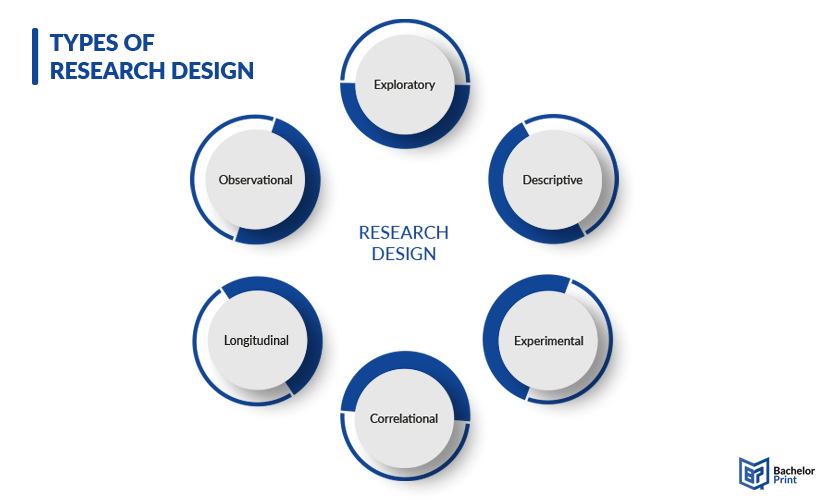
The primary purpose of a research design is to ensure that the evidence collected directly addresses the research problem in a clear and effective way. In social science research, this involves specifying the type of evidence needed to test the theory and ensure its relevance to the problem at hand. However, students can start their investigations early before they have the information to answer their study’s research question.
Definition: Research design
Research design is a blueprint that helps researchers and students structure their study by selecting the right methodologies and techniques. It organizes different elements of research in a simple and systematic way, which makes the research process more effective and efficient.
Types
The best design is unbiased and provides accurate information. Therefore, it is important to have a design that fits all the main characteristics of a good one: generalization, reliability, neutrality, and validity. Therefore, students will have several types of design to choose from to fit their research needs.
Research designs are broadly categorized into two classes: qualitative vs. quantitative research. However, you can break these designs down into smaller categories. Some of them are described below.
This design is used when the problem is not well-defined, meaning it is conducted at the early stages of a research process. It lays the groundwork for investigations while refining research procedures. Common methods are literature reviews, expert interviews, and focus groups.
The descriptive research design describes characteristics, averages, problems, and trends without influencing variables. It is a design based on a theory developed by analysing, gathering, and presenting already collected data, e.g., through survey research. Common methods are surveys, observational studies, and case studies.
This design tries to create a relationship between the effect and cause of the situation. An experimental design is causal in that the student needs to observe the effect an independent variable has on a dependent variable. The experimental design often splits research participants into two groups: the control group and experimental group. The fact that it helps solve at-hand problems makes it a highly practical design for students. Common methods for this research design are A/B testing and controlled experiments.
It is a non-experimental design technique that will help students establish a relationship between closely related variables. The student will use statistical tests to calculate any relations between the groups. A correlation coefficient is used to determine the relationship between the two variables, which can either be positive, negative, or nonexistent.
A longitudinal study observes the same research subjects or variables over a long period of time to identify changes. Common methods include repeated surveys and cohort studies.
As one can tell from the name, observational study involves observing subjects without any manipulation by the researcher. Due to the natural setting, the data collected has a higher validity and reliability than other research design methods. However, the research can be influenced by observer bias, time-consuming, and difficult to replicate.

How to create a research design
Creating a design means that you make key decisions about sources, participants, data types, and research locations. To have a perfect design, you need to follow these simple and effective steps.

Considering your practicalities & priorities
Most research problems allow for multiple design choices. A student’s choice will entirely depend on your research priorities and trade-offs — some designs may be strong in one aspect but weaker in another. So, consider factors such as time and resources before making a decision, e.g., by using the SMART goals framework.

Determining the type of data you need
Since you already have the research type you want to conduct based on your research questions and problem statement, you only have two choices you can use to start: primary vs. secondary data (collect new data or use existing data) and qualitative vs. quantitative data (subjective insights or numerical data).

Choosing a data collection method
You need to know where, when, and how to collect data once you have the data to use. Therefore, the student needs to determine the methods that include appropriate methods, techniques, specific tools, and sources. Also, you have to decide the criteria for selecting data sources and participants.

Decide how to analyse your data
Data analysis is essential to answering your research questions. Therefore, you can choose between quantitative and qualitative analysis techniques for an effective problem-solving process.

Write your research proposal
Design is an important part of your thesis or dissertation proposal. It helps to show your supervisor that the project can answer the research question and is feasible. The research proposal simply describes how you plan to do the project and what you are planning to do.
in Your Thesis
Examples
Depending on the topic, students may use descriptive, exploratory, or experimental research designs to systematically collect and analyse data for their studies. Below are some example research scenarios.
FAQs
A research design is like a blueprint that guides how a study is conducted and helps solve the research problem in an efficient way.
The four main types are as follows:
- Exploratory research design
- Descriptive research design
- Experimental research design
- Correlational research design
A good example is a cross-sectional survey that examines how different age groups perceive gender-neutral marketing. Researchers collect data at one point in time using structured questionnaires and analyse the differences in consumer attitudes.
Factors that can influence it are:
- Research objectives: The goal of the study determines the approach (e.g., exploratory vs. experimental)
- Time and budget: Limited resources affect the complexity and scale of the research
- Type of data: Qualitative (opinions, experiences) vs. quantitative (numbers, statistics) data impact design choice
- Target population: The group being studied (e.g., age, gender, location) influences the sampling method
- Ethical considerations: Consent, privacy, and fair treatment of participants must be guaranteed
- Research environment: Field study vs. controlled experiment affects how data is collected
